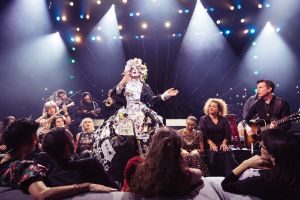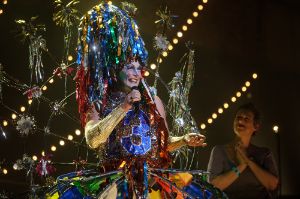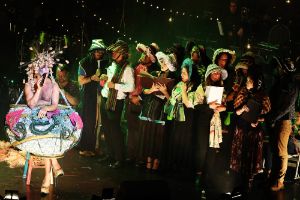Performance
Taylor Mac – A 24-Decade History of Popular Music
Chapter 1 – 4
European Premiere
Trailer © Berliner Festspiele
With 246 pop songs through 240 years of American history: Taylor Mac’s monumental show “A 24-Decade History of Popular Music” tells an alternative story of the USA over four evenings.
Taylor Mac’s outstanding pop odyssey “A 24-Decade History of Popular Music” decodes the social history of the United States through 246 songs that were popular from 1776 to the present day. Having earned vast acclaim in the U.S. as one of the most celebrated theater events of the decade, the 24-hour extravaganza comes to the Haus der Berliner Festspiele for its European premiere and exclusive European performance of this unabridged version. “‘A 24-Decade History of Popular Music’ is a re-enactment that shows why individuals and movements, if they consistently remain united, have the potential to flourish and become ever more just,” says Taylor Mac. “I’m not a teacher. It’s my job to remind people of something. I remind the audience about things they’ve forgotten, dismissed or buried –or that others have buried for them.”
Taylor Mac creates an opulent, genre-defying show with lush new arrangements of all 246 songs by Music Director Matt Ray. Costume designer Machine Dazzle, a longtime Mac collaborator, has handmade outrageously imaginative, world-unto-themselves costumes specific to each decade. Joining Mac over the course of the four six-hour performances – each covering six decades of American history – will be over 100 other artists, including Berlin musicians, special guests and a group of “Dandy Minions”: performers of all kinds from the most diverse communities in Berlin. Together with them and the audience judy – Taylor Mac’s preferred gender pronoun – develops the experience of a collective happening that dissolves all boundaries and takes everyone on an epic journey.
Chapter 1 (1776–1836)
Where else to start a subversive spectacle about the United States than 1776, the year the 13 American settlement colonies declared independence from the British? Taylor Mac charts a unique history of this era, covering the early women’s liberation movement, the War of 1812 and the Indian Removal Act, which served to legitimise the displacement of Native Americans. Issues of migration and colonisation jostle with hetero-normativity and queer performativity. In the first chapter judy – Taylor Mac’s preferred gender pronoun – celebrates the things that have been forgotten, buried, or dismissed by Manifest Destiny.
Chapter 2 (1836–1896)
In the second leg of Taylor Mac’s musical extravaganza, we follow the secret routes of the Underground Railroad, an escape network that rescued more than 30.000 African American slaves before and during the Civil War. Mac stages a competition between two luminaries of 19th century verse with songs by Stephen Foster and poems by Walt Whitman. After reenacting the Civil War with ping pong balls and pup tents, the evening culminates in “The Marskado”, judy’s psychedelic dinner theatre version of the Gilbert and Sullivan opera “The Mikado.”
Chapter 3 (1896–1956)
In the third chapter, Taylor Mac begins the history of 20th century America with the songs of the crowded and airless tenements of New York’s Lower East Side. After showing us the horrors of the frontlines in the First World War, judy returns us shaken and stirred to the speakeasies of New York to celebrate the artistic and social movements of the Harlem Renaissance. This chapter finishes with a musical protest against racism and displacement, recreating the Zoot Suit Riots, a series of racist disturbances against the Mexican-American residents of Los Angeles during the Second World War.
Chapter 4 (1956–2019)
The finale of Taylor Mac’s 24-hour pageant through 24 decades history of the United States is all about revolution and political protests. In the fourth chapter, Judy pays tribute to Bayard Rustin’s March on Washington with protest anthems and follows the Civil Rights Movement in the struggle against racism and discrimination. Judy heralds the lesbian and gay rights movement in the fight for freedom and equal rights in the 1960s and 70s, from the joys of Flower Power and Disco to the devastating AIDS-epidemic and the rises of Queer Power. The fourth chapter of “A 24-Decade History of Popular Music” celebrates the communities that unite against oppression to bring about social transformation.
Creator, writer, performer Taylor Mac
Dramaturg Jocelyn Clarke
Costumes Machine Dazzle
Musical Director, Arranger Matt Ray
Co-Director Niegel Smith
Scenic Designer Mimi Lien
Lighting Designer John Torres
Sound Designer Jimin Brelsford
Choreographic Consultant Jawole Zollar
Creative Producers Pomegranate Arts







